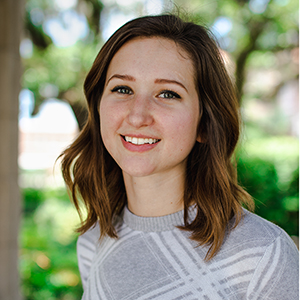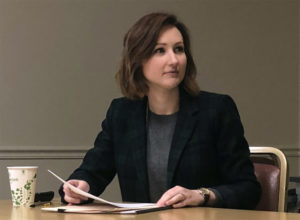Introducing Dr. Britt Boler Hunter
 This summer, Dr. Britt Boler Hunter defended her dissertation, “The Wellcome Apocalypse: Innovating Pictorial Traditions in the Ordinatio of a Late Medieval Multi-Text Manuscript,” under the supervision of Dr. Richard K. Emmerson and Dr. Stephanie Leitch. Her broader research focuses on the circulation and reception of visual information in late medieval European books.
This summer, Dr. Britt Boler Hunter defended her dissertation, “The Wellcome Apocalypse: Innovating Pictorial Traditions in the Ordinatio of a Late Medieval Multi-Text Manuscript,” under the supervision of Dr. Richard K. Emmerson and Dr. Stephanie Leitch. Her broader research focuses on the circulation and reception of visual information in late medieval European books.
Dr. Hunter developed a curiosity for Apocalypse manuscripts when she majored in art history and religion as an FSU undergraduate (BA ’14). Apocalypticism brought her back to the FSU Art History department in 2016 to study with internationally renowned medievalist Richard K. Emmerson. Over the years, her interests have expanded into other forms of late medieval and early modern visual exegesis, especially centering on knowledge-building, narrative, and compilation.
Hunter’s dissertation research was funded by an International Center of Medieval Art student travel grant and the Penelope Mason Dissertation Research Award. She was a Patricia Rose Teaching Fellow, creating and teaching survey classes for the department, and was selected to teach at the FSU Florence Study Center in the Summer of 2021. Dr. Hunter has presented at several national and international conferences and helped organize conferences and sessions for the Center for Renaissance Studies at the Newberry Library, the International Congress on Medieval Studies, and the 35th and 37th Annual Art History Graduate Student Symposium at FSU.

In May, Dr. Hunter began the next chapter of her career in higher education by joining the FSU College of Law Research Center as a faculty librarian. Concurrent with her graduate studies, Dr. Hunter has been pursuing professional development in the field of librarianship by working for institutions including the State Archives of Florida, Florida Agricultural and Mechanical University Architecture Library, and Thomas University. As a newly minted law librarian, Dr. Hunter’s transferrable expertise in historiographic and primary source research will be aimed at facilitating academic legal research and supporting scholarly projects. She will teach International and Foreign Legal Research with a focus on public law and human rights and continue her research as an independent medievalist.
Hunter writes that her most rewarding experiences as a graduate student have been the opportunities to research and publish alongside her advisors. Between 2018 and 2020, she co-authored a facsimile commentary with Dr. Emmerson, and in the Fall of 2021, she was invited to present research alongside Dr. Leitch at Emory University which will feature in a forthcoming edited volume.
For me, it’s been an absolute joy to pursue my PhD in this department. The doors that have been opened to me here – handling 1000-year old books, traveling the world, teaching students about the universal language of art – these are all experiences that have fundamentally shaped me as an educator and a human. I’m profoundly grateful to have spent six years with some of the most brilliant and curious minds I’ll ever know, many of whom are now life-long friends and mentors.
Hunter’s advisor Rick Emmerson writes,
Britt is a remarkable young scholar-teacher whose wide-ranging talents focus on medieval illustrated manuscripts and early printed books. Her substantial dissertation on the German fifteenth-century Wellcome Apocalypse, an important and complex Latin manuscript that includes a bewildering variety of eschatological, legendary, medical, and moral illustrated commentaries, diagrams, poems, and treatises, promises to revolutionize scholarly understanding not only about this important and fascinating book but also more generally about late medieval apocalypticism. Adopting a fresh approach to the multi-text manuscript, Britt not only places the Wellcome Apocalypse within its art historical, literary, and religious contexts, but also successfully reframes its relationship to a two-hundred-year-old iconographic tradition. Significantly, her dissertation reverses long-established scholarly assumptions based on a simplistic evolutionary history in which printed books developed from and replaced manuscripts by convincingly linking important image cycles in Wellcome to popular printed contemporary block books. Britt has delivered several papers at international conferences and symposia, has already published a journal article and two commentary chapters, and has other publications forthcoming. In addition to her scholarly accomplishments, she is a multi-talented teacher and professional librarian who is likely to enjoy a brilliant career working with and teaching manuscripts and rare books.